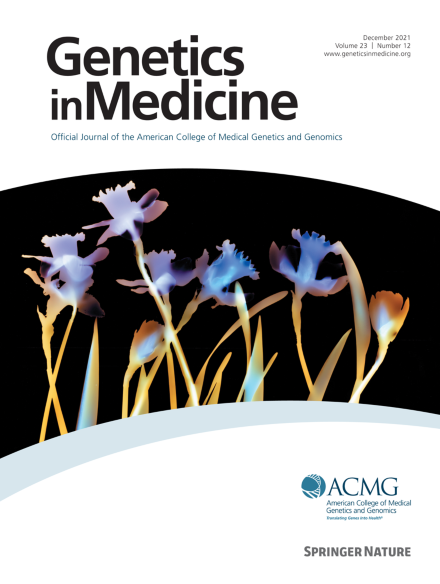ClinGen recuration of hearing loss-associated genes demonstrates significant changes in gene-disease validity over time
IF 6.6
1区 医学
Q1 GENETICS & HEREDITY
引用次数: 0
Abstract
Purpose
The Clinical Genome Resource (ClinGen) Hearing Loss Gene Curation Expert Panel was assembled in 2016 and has since curated 174 gene-disease relationships (GDRs) using ClinGen’s semiquantitative framework. ClinGen mandates the timely recuration of all GDRs classified as Disputed, Limited, Moderate, and Strong every 2 to 3 years.
Methods
Thirty-five GDRs met the criteria for recuration within 2 years of original curation. Previous evidence was reevaluated using the latest curation guidelines, and a comprehensive literature review was performed to obtain new evidence. Recurations were approved by the Gene Curation Expert Panel and published on the ClinGen website (www.clinicalgenome.org).
Results
Eight of 35 GDRs (22%) changed their classification. Two Moderate and 5 Strong GDRs were upgraded to Definitive because of new case evidence. One Strong was subsumed under another Definitive GDR after evaluation of the lumping/splitting of disease entities. Twenty-seven of 35 patients remained unchanged, with little to no new evidence reported.
Conclusion
Genes classified as Moderate and Strong were likely to build evidence and change their classification over time, whereas Limited were unlikely to gain evidence. These findings highlight the critical role of recuration in ensuring that genetic tests and research studies incorporate the most recent evidence into their efforts.
求助全文
约1分钟内获得全文
求助全文
来源期刊

Genetics in Medicine
医学-遗传学
CiteScore
15.20
自引率
6.80%
发文量
857
审稿时长
1.3 weeks
期刊介绍:
Genetics in Medicine (GIM) is the official journal of the American College of Medical Genetics and Genomics. The journal''s mission is to enhance the knowledge, understanding, and practice of medical genetics and genomics through publications in clinical and laboratory genetics and genomics, including ethical, legal, and social issues as well as public health.
GIM encourages research that combats racism, includes diverse populations and is written by authors from diverse and underrepresented backgrounds.
 求助内容:
求助内容: 应助结果提醒方式:
应助结果提醒方式:


